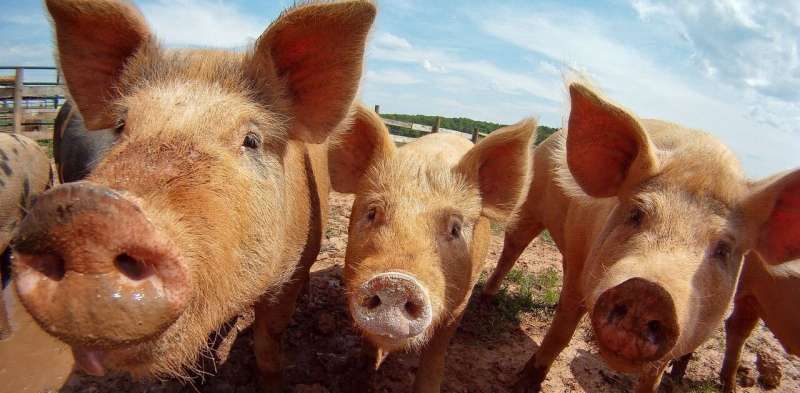'Organic' label doesn't guarantee that holiday ham was a happy pig

This holiday season, Americans will buy .
Some of these turkeys and hams will be certified organic, reflecting the common belief that organically raised animals live happier, more natural lives.
The reality, though, is more complicated.
Government regulations for organic farming contain few specific protections for pigs, poultry, egg-laying hens and other animals raised for human consumption. So conditions on organic farms may not actually be all that different from those at traditional livestock operations.
Organic explosion
The organic food industry has grown enormously in the U.S. in recent decades.
Organic farming began as a radical cause in the 1970s embraced by a . These pioneers sought to grow food naturally, rather than assert their dominance over the Earth. As such, they eschewed .
Animal ethics were part of these farmers' vision, too. Rather than thinking of livestock only as producers of meat, milk and eggs, many organic farmers viewed animals as that perform important functions like fertilizing soil and controlling pests.
Organic is now mainstream. Organic food sales in 2018 totaled nearly , up from $8.5 billion in 2002. .
But organic agriculture has struggled to maintain its early commitment to animal welfare.
In 2016, the U.S. Department of Agriculture under President Obama announced a new that enhanced animal welfare requirements for organic farms. Among other things, it set strict rules for outdoor access and prohibited what USDA called "physical alterations" of animals—what animal rights advocates call "mutilations."
In mainstream agriculture, pigs' , or "docked," so that they will not be bitten off by other pigs. Chickens have to prevent them from pecking one another.
But the agency two years later, in 2018, before it could take effect.
and organic farmers blamed and the for the policy change.
There's some truth to these assertions. But finds that politics isn't the only reason organic farms aren't required to treat animals more humanely.
USDA misses the mark
The – the only law governing organic farming in the United States—simply doesn't authorize federal regulators to protect animals raised "organically."
Congress passed the Organic Foods Production Act in 1990, directing the USDA to write national organic farming regulations.
Like many early organic farmers, the USDA's new rules focused on the integrity of agricultural materials. Fertilizers and pesticides from natural sources were allowed, while synthetic ones were mostly prohibited. In other words, the USDA defined "organic" to mean the lack of unnatural inputs.
When it came to more complicated questions about how livestock should be treated, though, . The law that came down from Congress offered the USDA little guidance on regulating organic animal welfare.
On conventional farms, animals are often raised in confined barns or cages, never seeing sunlight or breathing fresh air. The USDA's organic regulations, which went into effect in 2002, required "access to pasture" for cows and "access to exercise areas, fresh air, and direct sunlight" for poultry.
What this meant in practice remained open to interpretation. Some dairy farms , relegating them to dirt yards for the rest of the year. Large egg operations provided hens with small, concrete-floored porches.
And the regulations said nothing about tail docking and beak trimming. So organically raised pigs may still . Organic chickens can be .
Defending the animals
To improve how animals are treated on large-scale organic farms, animal welfare advocates have worked creatively within the USDA's limited regulatory scope.
Because organic regulations define allowed versus prohibited materials, activists have sought to extend the prohibition on synthetic fertilizers and pesticides to materials used in organic animal agriculture. Some have – a food supplement for birds raised in confinement—in organic farming.
If farmers cannot use methionine, their thinking goes, industrial-style organic chicken farms will no longer be viable. Farmers would have to raise chickens in smaller, outdoor operations. The birds would benefit.
Activists have also pressured ethically minded consumers to demand better living conditions for animals.
An animal rights watchdog group called the Cornucopia Institute in 2014 The images showed gigantic buildings and barren yards in which dairy cows and egg-laying chickens spent their days—not the bucolic conditions that many consumers envision when they buy organic.
"Shoppers who passionately support the ideas and values represented by the organic label understandably feel betrayed," the noted.
New regulations
The USDA defends its decision to withdraw the Obama-era organic animal welfare standards that would have enhanced outdoor access and prohibited tail docking and beak trimming.
, it lacks authority under the 1990 Organic Foods Production Act to implement such expansive rules.
My research confirms this. Congress gave the USDA a mandate to regulate synthetic inputs, not complex farming practices. There is very little in the 1990 federal organics law about animal welfare.
The Trump administration's decision to kill protections for organically grown animals is now in court, .
For concerned consumers, that means that serving an ethical holiday dinner requires some research.
Pigs and turkeys on some organic farms may well live their lives very differently from their conventionally raised cousins. But an "organic" label does not guarantee this.
Provided by The Conversation
This article is republished from under a Creative Commons license. Read the .![]()




















